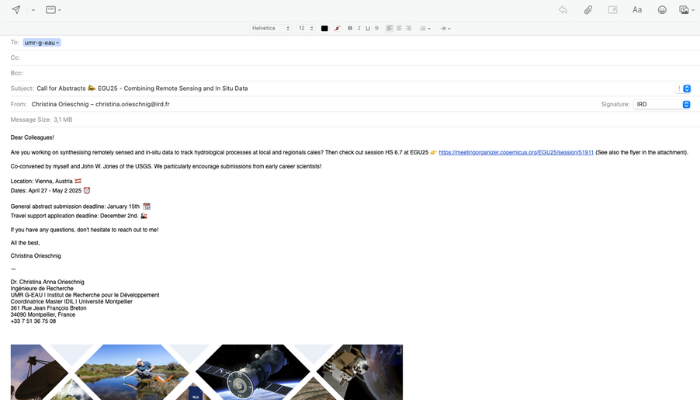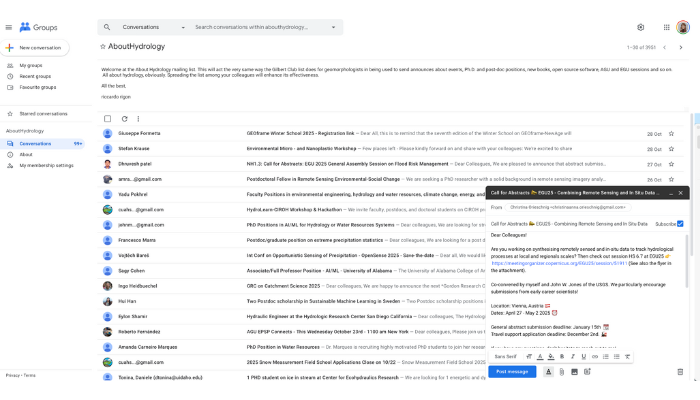
Since October 23rd, abstract submissions for EGU25 are officially open! For session conveners, this is a critical phase and promoting your session is crucial.
If you are co-convening a “traditional” session on a large topic that is run every year you might be inundated with abstracts already now or shortly before the deadline. However, many smaller sessions on more niche topics receive far fewer submissions. As a result, they are often merged with others or even pulled entirely from the programme.
But how can you get word out? Here are five strategies to promote your session and encourage abstract submissions.
Talk to Your Colleagues
First off, word of mouth is still incredibly effective.
Talk to your colleagues at your institute who work on the same topic as you. Outline your session’s focus over a cup of coffee and ask them to spread the word. Make sure your co-conveners do the same.
Did you meet someone at EGU24 who you think could give a great talk? Drop them a message on LinkedIn or an email! You can even propose to make them an invited speaker, which is also a great way to boost the diversity of your session’s talks. That would allow them to submit two abstracts to EGU25.
Leverage Mailing Lists
Next up, email lists are another great way to promote your session. Most institutes and departments have at least one internal mailing list that members can use to share updates. Most likely, you even have access to two or three – more if you participate in research projects that are shared between multiple institutions.
Sending a short message with your session description and a deadline for abstract submission can be a great way to get the conversation rolling with colleagues who are interested in contributing.

A message to an institute mailing list.
Advertise on Social Media
Another great way of promoting your session is on social media. Platforms like LinkedIn, Twitter and even Instagram offer opportunities to get in touch with researchers you have no prior connection to.
When you post on social media, make sure to include a link towards your session proposal, as well as relevant hashtags, such as #EGU25, #hydrology. Plus, you can tag your institution and your co-conveners so they can signal-boost your posts.
Pro-Tip: Include a custom image or video in your post! Social media is very visual-heavy and having an attention-grabbing graphic can make all the difference between someone scrolling past your post or pausing to read. These days, you don’t even have to be a graphic design whiz to put together a great visual. Online tools like Canva offer a large variety of customisable templates you can use for free.
Finally, make sure to re-post your session announcement every couple of weeks – especially in the days before the abstract submission deadline.

Examples of social media posts advertising a session on X and LinkedIn.
Pinpoint Professional Networks
Next up on our list of ways to promote your session is to leverage professional groups and networks in your niche.
Whether it’s a socio-hydrology specific LinkedIn group, or a broader Google Group like About Hydrology, these spaces are a prime opportunity of making sure word about your session gets out.
Plus, they are a much more targeted environment than social media in general – you know that their audience, though smaller, is exactly who you want to reach.

A post in the About Hydrology Google group advertising a session.
Stay Classic With Message Boards
Finally, you shouldn’t underestimate the classic strategies of promoting your session – offline message boards. Most institutes have one or two places where researchers can add their news to sprawling pinboards.
Even if your session announcement may be jammed between ads for yoga classes and a lost cat flyer, these message boards are often surprisingly effective. Especially in the days of overflowing email inboxes and social media overload.
Once you’ve put together an announcement flyer, share it with your co-conveners so they can print it and advertise at their institutes as well. Ideally, you’ll want to display it in a common area where people tend to linger. Bonus points if it’s near the coffee machine.

A flyer for a call for abstracts on a message board.
Conclusion
Promoting your session can be nerve-wracking, but it’s essential work for conveners.
Heads-up, though: As you tick off the days until the end of abstract submissions on January 15th, don’t be discouraged if your number of submissions languishes. The vast majority of researchers tend to only submit their abstracts in the last few days before the deadline!





Alfun adam
Good Information
Regards, Unissula